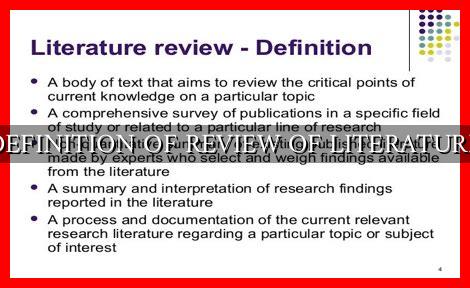-
Table of Contents
The Definition of Review of Literature
When embarking on a research project, one of the crucial steps is conducting a review of literature. This process involves examining existing scholarly works, studies, and publications related to the topic of interest. By synthesizing and analyzing this body of literature, researchers can gain a deeper understanding of the subject, identify gaps in knowledge, and build a solid foundation for their own study.
What is a Review of Literature?
A review of literature, often referred to simply as a literature review, is a critical evaluation of existing research and scholarship on a particular topic. It involves systematically searching, analyzing, and synthesizing relevant sources to provide a comprehensive overview of the current state of knowledge in the field. The primary goal of a literature review is to identify key themes, trends, and debates, as well as gaps in the existing literature that warrant further investigation.
Key Components of a Literature Review
- Identification of the research question or topic
- Search for relevant sources
- Critical evaluation of the literature
- Synthesis of key findings
- Identification of gaps in knowledge
Types of Literature Reviews
There are several types of literature reviews, each serving a specific purpose:
- Narrative Review: Provides a comprehensive overview of the literature without a specific methodology.
- Systematic Review: Involves a structured and rigorous approach to searching, analyzing, and synthesizing the literature.
- Meta-analysis: Quantitatively combines the results of multiple studies to draw conclusions.
Importance of Review of Literature
A review of literature is essential for several reasons:
- It helps researchers understand the current state of knowledge in their field.
- It provides a theoretical framework for the study.
- It helps identify gaps in the existing literature that can be addressed in the research.
- It prevents duplication of research and ensures that the study is original and contributes to the body of knowledge.
Example of a Review of Literature
For example, a study on the impact of social media on mental health might begin with a review of literature that examines previous research on the topic.
. The review could highlight studies that have found a correlation between social media use and increased feelings of loneliness and depression. It could also identify gaps in the literature, such as the need for more research on the effects of specific social media platforms on different age groups.
Conclusion
In conclusion, a review of literature is a critical component of the research process that helps researchers build on existing knowledge, identify gaps in the literature, and establish a solid foundation for their study. By conducting a thorough review of the literature, researchers can ensure that their research is relevant, original, and contributes meaningfully to the field.
For further reading on the topic, you can refer to this comprehensive guide on literature reviews.


